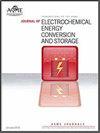基于扩展卡尔曼滤波级联深度信念网络的电池荷电状态高精度估计策略
IF 1.9
4区 工程技术
Q3 ELECTROCHEMISTRY
Journal of Electrochemical Energy Conversion and Storage
Pub Date : 2023-10-13
DOI:10.1115/1.4063431
引用次数: 0
摘要
摘要电池荷电状态估计是电动汽车电池管理系统的主要功能之一。如果电池的实际SOC与估计值相差较大,则可能导致电池使用不当,导致意外的电压快速下降或升高,从而影响驾驶安全。因此,高精度的SOC估算对于电池的管理和使用具有重要意义。目前使用的SOC估计方法存在对模型参数的依赖性强、测量误差传播和对初始值的敏感性等问题。在这项研究中,我们提出了一种基于深度信念网络(DBN)特征提取和扩展卡尔曼滤波(EKF)的高精度SOC估计策略。采用动态应力测试(DST)和城市测力计驾驶时间表(US06)驾驶循环,在不同温度条件下对所提出的策略进行了严格测试。该策略的平均绝对误差(MAE)和均方根误差(RMSE)分别控制在1.1%和1.2%以内。这证明了实现的高精度估计。为了进一步验证该策略的普遍性,我们还将其应用于石墨烯电池,并在US06和公路燃油经济性测试(HWFET)下在25°C和- 10°C的温度下进行了测试。测试结果表明,MAE分别为0.47%和2.01%。本文章由计算机程序翻译,如有差异,请以英文原文为准。
High-Accuracy Battery SOC Estimation Strategy Based on Deep Belief Network Cascaded with Extended Kalman Filter
Abstract Battery state of charge (SOC) estimation is one of the main functions of the battery management system in electric vehicles. If the actual SOC of the battery differs significantly from the estimated value, it can lead to improper battery usage, resulting in unexpected rapid voltage drops or increases, which can affect driving safety. Therefore, high-accuracy SOC estimation is of great importance for battery management and usage. Currently used SOC estimation methods suffer from issues such as strong dependence on model parameters, error propagation from measurements, and sensitivity to initial values. In this study, we propose a high-precision SOC estimation strategy based on deep belief network (DBN) feature extraction and extended Kalman filter (EKF) for smooth output. The proposed strategy has been rigorously tested under different temperature conditions using the dynamic stress test (DST) and urban dynamometer driving schedule (US06) driving cycles. The mean absolute error (MAE) and root-mean-square error (RMSE) of the proposed strategy are controlled within 1.1% and 1.2%, respectively. This demonstrates the high-precision estimation achieved. To further validate the generality of this strategy, we also apply it to graphene batteries and conduct tests under US06 and highway fuel economy test (HWFET) driving cycles at temperatures of 25 °C and −10 °C. The test results show MAE of 0.47% and 2.01%, respectively.
求助全文
通过发布文献求助,成功后即可免费获取论文全文。
去求助
来源期刊

Journal of Electrochemical Energy Conversion and Storage
Engineering-Mechanics of Materials
CiteScore
4.90
自引率
4.00%
发文量
69
期刊介绍:
The Journal of Electrochemical Energy Conversion and Storage focuses on processes, components, devices and systems that store and convert electrical and chemical energy. This journal publishes peer-reviewed archival scholarly articles, research papers, technical briefs, review articles, perspective articles, and special volumes. Specific areas of interest include electrochemical engineering, electrocatalysis, novel materials, analysis and design of components, devices, and systems, balance of plant, novel numerical and analytical simulations, advanced materials characterization, innovative material synthesis and manufacturing methods, thermal management, reliability, durability, and damage tolerance.
 求助内容:
求助内容: 应助结果提醒方式:
应助结果提醒方式:


